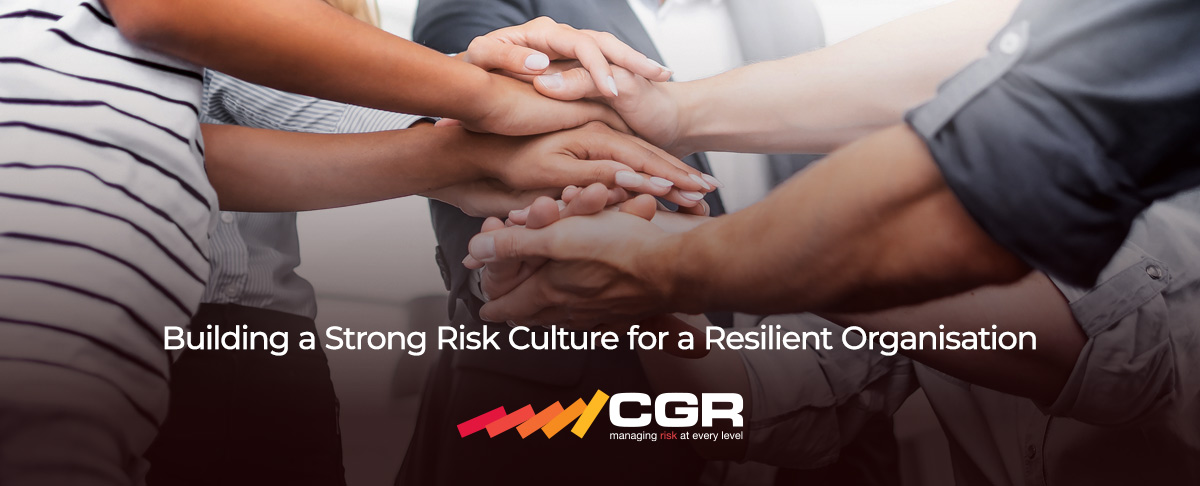Building a Strong Risk Culture for a Resilient Organisation
There is a well-known saying that “culture eats strategy for breakfast.” In high-risk industries such as mining, transportation, and nuclear energy, this could just as easily be reworded as “culture eats risk frameworks for breakfast.” Even the most sophisticated Risk Management strategies will fail if an organisation’s culture does not support them. Risk culture, the collective values, behaviours, and attitudes towards risk, determines whether warnings are acted upon or ignored. A strong risk culture fosters transparency, accountability, and proactive decision-making, helping organisations navigate uncertainty and build long-term resilience.
When Risk Culture Fails: The Real-World Consequences
The importance of risk culture becomes clear when examining failures. In high-risk industries, even minor issues can escalate into catastrophes if an organisation discourages transparency. In mining, for example, if employees feared raising safety concerns due to potential retaliation, early warning signs of instability may be ignored until a tunnel collapses with devastating consequences. Similarly, a transportation company that ignores maintenance alerts due to complacency could face a major derailment that was entirely preventable.
Even in heavily regulated environments such as government and nuclear energy, weak risk culture can have dire consequences. A government agency that pressures teams to “only bring solutions, not problems” may suppress crucial early warnings, leading to costly overruns or reputational damage. In a nuclear facility where mistakes are punished rather than used as learning opportunities, staff may hesitate to report anomalies, potentially escalating minor concerns into full-blown emergencies. These examples illustrate how poor risk culture is not just an abstract concept, it has tangible, often severe consequences that extend beyond operational losses.
The Strategic Advantage of a Strong Risk Culture
Beyond immediate safety concerns, a strong risk culture supports long-term success. Organisations that prioritise risk awareness foster agility and resilience. They identify and address emerging threats before they escalate, maintain regulatory compliance with confidence, and build trust with employees and stakeholders. A proactive risk culture does not just prevent failure -it creates a foundation for sustained success and competitive advantage.
When transparency and accountability in Risk Management are lacking, leaders operate with incomplete or distorted information, increasing the likelihood of poor decision-making, operational failures, and strategic missteps. External stakeholders, including regulators, policymakers, and the public, quickly recognise when an organisation downplays risks or lacks a proactive approach. This can lead to heightened scrutiny, regulatory interventions, or reputational damage that takes years to repair. In contrast, organisations that embed Risk Management into their culture position themselves for long-term stability and growth.
Strengthening Risk Culture: The Role of Risk Managers
Risk Managers are central to embedding and sustaining a strong risk culture within an organisation. While cultural transformation requires broad engagement, Risk Management professionals are uniquely positioned to drive change, foster accountability, and integrate best practices at every level.
For a risk-conscious culture to thrive, leadership must be actively engaged. When executives and board members openly discuss and address risks, it reinforces the message that Risk Management is an essential pillar of business resilience. By prioritising risk considerations, leadership sets the tone for the entire organisation, ensuring that risk awareness becomes second nature rather than an afterthought.
Equally important is creating an environment where employees feel safe to raise concerns without fear of repercussions. Confidential reporting channels and a no-blame approach to near-miss reporting encourage proactive risk identification. Open dialogue fosters transparency and trust, ensuring that risks are addressed before they escalate into significant issues.
Embedding risk considerations into daily decision-making further strengthens an organisation’s resilience. Risk Management should not exist in isolation but should be fully integrated into project planning, budgeting, and corporate strategy. When risk is consistently evaluated within core business functions, organisations can anticipate challenges, mitigate vulnerabilities, and position themselves for long-term success.
A strong risk culture is also reinforced through recognition and reward. Employees who proactively identify and mitigate risks should be acknowledged for their contributions. Highlighting examples of how effective Risk Management has prevented crises strengthens the organisation’s commitment to resilience and reinforces a culture where managing risk is everyone’s responsibility.
Organisations must also embrace a learning mindset. Incidents and near-misses should be seen as opportunities for improvement rather than occasions for blame. Conducting thorough post-incident reviews, identifying root causes, and sharing lessons learned ensures that mistakes are not repeated. A culture that values continuous learning fosters adaptability and strengthens the organisation’s ability to navigate an ever-evolving risk landscape.
Final Thoughts
Building a strong risk culture is not an overnight task, but it is one of the most powerful enablers of organisational resilience. In industries where safety, operational continuity, and regulatory compliance are paramount, risk culture determines whether an organisation is proactive or reactive in handling threats.
Risk Managers understand that technical controls and policies alone are not enough. Without a culture that encourages openness, accountability, and forward-thinking Risk Management, even the best frameworks will fail. By fostering an environment where risks are actively discussed, addressed, and integrated into decision-making at all levels, organisations enhance their resilience, protect their mission, and secure long-term success.
The question is not whether risk culture matters – it is whether your organisation is actively shaping it as a strategic asset. Those that invest in strong risk culture today will be the ones that thrive tomorrow.





